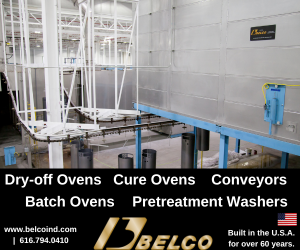Inconsistent Gloss Problem
Question: Regarding the letter from T.B. in the October Painting Clinic, I had run across a similar fouling in the oven that would cause an inconsistent gloss.
Question:
Regarding the letter from T.B. in the October Painting Clinic, I had run across a similar fouling in the oven that would cause an inconsistent gloss. Ammonium carbonate took care of the problem. Of course, we would usually investigate the source of the material causing the problem, usually triclor or perchlor somewhere in the plant. When we could not find the source, we used the ammonium carbonate. S.B.
Answer:
This question refers to a problem relating to inconsistent gloss on parts coated using a two-component polyurethane baking enamel. T.B. wanted a chart showing catalyst ounces vs. gloss. I gave him chapter and verse on handling two-component materials as well as typical causes for gloss variations. As usual, I left the door open for remarks from my faithful readers (without them, there would be no Painting Clinic).
If S.B. said that he used ammonium carbonate to cure a fouled oven and maintain gloss consistency, I believe him. However, as a scientist, my curiosity was aroused. I wondered what the effect was. How did S.B. use it, and in what form? Naturally I turned to my freshman chemistry textbook, "College Chemistry, An Introductory Textbook of General Chemistry," Linus Pauling, W. H. Freeman and Company, 1950. I knew that I was in trouble when I realized its Periodic Table showed only 98 elements. There was nothing about ammonium carbonate mentioned. I went through my archives of coatings and scientific books without any references to that compound. My search was not in vain. I did re-learn how a coke byproducts oven works. I just built such an oven battery for my HO scale railroad.
Finally, I checked my "Random House Dictionary of the English Language," Random House, Inc., 1973, an 11-lb volume with a Periodic Table listing 103 elements. It defines ammonium carbonate as "a water-soluble mixture of ammonium bicarbonate and ammonium carbamate,...used chiefly in the manufacture of smelling salts and baking powder." Thanks again for your help, S.B. After I'm revived by the smelling salts, I will bake you a cake.
Related Content
-
Coatings Plant Evolves with Market Trends
Expanding its focus from exclusively serving the RV industry, one of this company’s stand-alone coatings plant has successfully extended its services to additional markets.
-
Masking Solutions Provider CFS Dramatically Expands Capabilities and Capacity
Custom Fabrication & Supplies (CFS) completed a new plant expansion packing 10 times the capacity into twice the space. It dramatically enhances the supplier’s custom capabilities to provide extremely precise and cost-effective masking solutions.
-
Robots, AI and Superb BMW Surfaces
There isn’t an automotive paint shop in the world that doesn’t have post-paint inspection and defect processing. But BMW is doing this with levels of technology at a plant in Germany that exceed all other paint shops in the world.












.jpg;maxWidth=300;quality=90)


